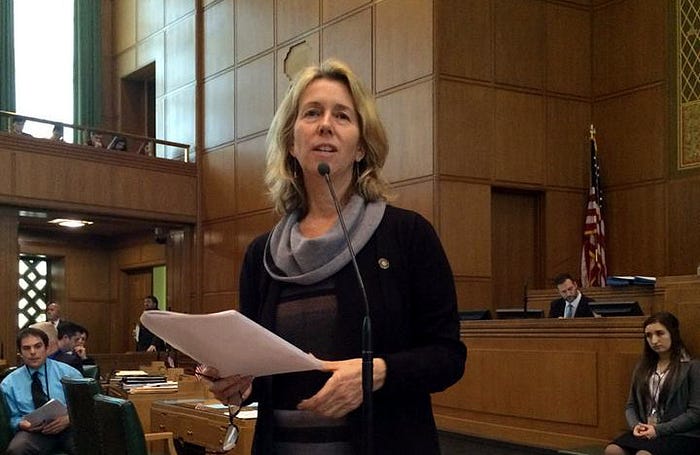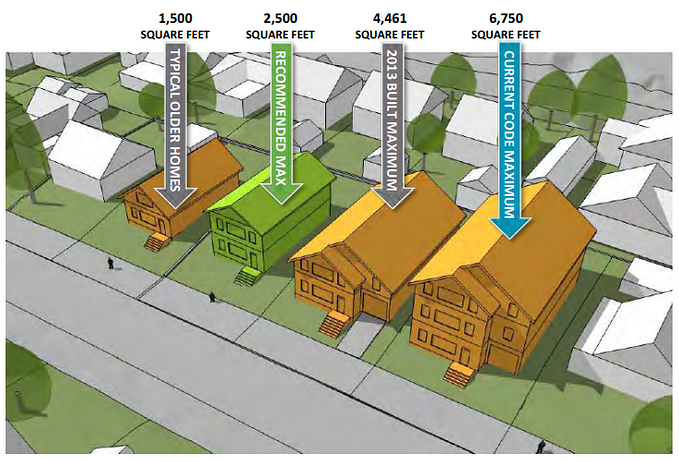Oregon lawmakers vs. housing prices: A mid-year update
Eleven interesting ideas for responding to Oregon’s price spike are still alive.
by Michael Andersen | May 9, 2017

Even in a state legislature controlled entirely by one party, only the strongest ideas survive.
Oregon’s Democrat-led legislature has spent the last four months vetting its members’ many suggestions for answering the state’s surge in housing costs. With two months to go in their 2017 session, lawmakers’ deadline for agreement is approaching. Many proposals have already been left for dead; a few have been actively killed by their enemies.

On Monday we checked in on every housing-related bill remaining before this year’s legislature. And here’s a fact: the House of Representatives housing committee, led by Rep. Alissa Keny-Guyer of mid-southeast Portland, has seen a frenzy of action. The nine-member committee has passed numerous bills, most of them unanimously or with one or two “no” votes.
Here’s a short summary of the most interesting proposals and their current status.
H.B. 2004 A — Lets cities limit residential rent hikes to a “fair rate of return” for landlords and blocks no-cause evictions after the first six months of tenancy. Passed housing committee and full House on party-line vote with Democratic support. Waiting for Senate action. You can email shs.exhibits@oregonlegislature.gov to weigh in.
H.B. 2007 A — Uses various measures to encourage construction of lower-cost housing. Includes duplexes and backyard cottages in the definition of “single-family zones” statewide; requires all but the smallest cities and counties to fast-track permits of below-market-rate housing; requires direct local government approval of new historic districts; lets churches develop below-market-rate housing on their own land. Passed housing committee with bipartisan support, waiting for spending committee and a full House vote. You can email Rep.TinaKotek@state.or.us and your own legislators to weigh in.
H.B. 2010 A — Creates a task force to look at racial home ownership disparities including access to mortgage loan application practices and deliberate descrimination. The task force would propose solutions for the state and others to take up in the future. Passed housing committee with bipartisan support, waiting for spending committee and a full House vote. You can email Rep.TinaKotek@state.or.us and your own legislators to weigh in.

H.B. 2210 — Subsidizes small repairs to older and cheaper apartment buildings in exchange for an affordability guarantee. Passed housing committee with bipartisan support, waiting for spending committee and a full House vote. You can email Rep.TinaKotek@state.or.us and your own legislators to weigh in.
H.B. 2433 A — Pilots a program letting school districts develop housing for low-income seniors at reduced rent, in exchange for classroom assistance. Passed housing committee with bipartisan support, waiting for spending committee and a full House vote. You can email Rep.TinaKotek@state.or.us and your own legislators to weigh in.
H.B. 2456 — Lets churches and nonprofits develop low-cost attached homes in rural areas, outside urban growth boundaries. The rent can be no more than 30 percent of the county’s median income. Passed housing committee with bipartisan support, waiting for agriculture committee and a full House vote. You can email hagnr.exhibits@oregonlegislature.gov to weigh in.
H.B. 2724 — Attempts to help higher-risk tenants find homes by lowering the risk to landlords who take a chance on them. Tenants with low incomes, bad credit, criminal histories or an eviction history would qualify for a new “rent guarantee program.” If landlords rent to those tenants but the tenant fails to make rent, gets evicted, or damages the home, then landlords could apply for up to $2,000 reimbursement during the first year of a lease. A single landlord could receive up to $5,000. Passed housing committee with bipartisan support, waiting for spending committee and a full House vote. You can email Rep.TinaKotek@state.or.us and your own legislators to weigh in.
H.B. 2377 A — Lets cities and counties offer tax cuts for rehabilitating existing low-cost multifamily housing as well as for building it new. Passed housing committee with bipartisan support, waiting for revenue committee and a full House vote. You can email Rep.TinaKotek@state.or.us and your own legislators to weigh in.

H.B. 2964 — Lets cities and counties offer tax cuts for rehabilitating existing low-cost single-family housing as well as for building it new. Passed housing committee, revenue committee and full House with bipartisan support, waiting for Senate action. You can email shs.exhibits@oregonlegislature.gov to weigh in.
H.B. 3192 A — Creates a $5 million fund to subsidize first-time home purchases by low-income Oregonians. Grants from the Down Payment Assistance Fund would be passed through nonprofits. Passed housing committee with bipartisan support, waiting for revenue and spending committees and a full House vote. You can email Rep.TinaKotek@state.or.us and your own legislators to weigh in.
H.B. 3387 A — Creates a task force to research improvements to Oregon’s development fee system. The fees are designed to force new homes to cover the costs of the sewers, roads and parks they require, but they can also reduce housing supply or drive up costs. Passed housing committee with bipartisan support, waiting for spending committee and a full House vote. You can email Rep.TinaKotek@state.or.us and your own legislators to weigh in.
There are also many smaller bills still moving. They do things like increasing the notice period for terminating a mobile home lease, giving the public the first chance to purchase state-subsidized rentals and allowing small expansions of a region’s urban growth boundary every three years.
Which of these would work, and for whom? Which would backfire? Which would sink silently to the bottom of the housing crisis like so many pennies in a fountain? We’ll leave that future for you to predict and shape.
Portland for Everyone supports abundant, diverse, affordable housing. This is a reported blog about how to get more of those things. You can follow it on Twitter and Facebook or get new posts by email a few times each month.










